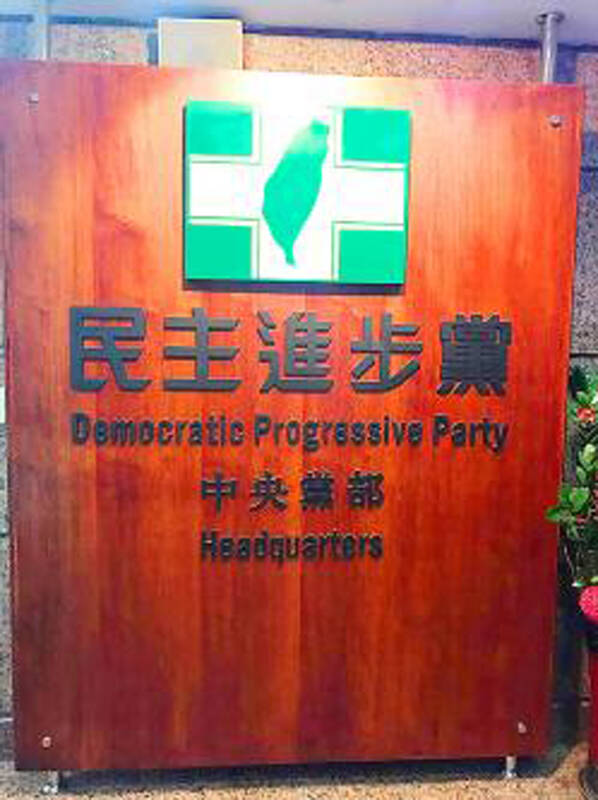Taiwan and China are not subordinate to each other and only Taiwanese can decide on the nation’s future, the Democratic Progressive Party (DPP) said yesterday.
The party issued the remarks following former legislative speaker Wang Jin-pyng’s (王金平) proposal of a new cross-strait formula based on “separate governance without division” between Taiwan and China.
The Chinese Nationalist Party’s (KMT) Wang on Sunday said that “the two sides of the Taiwan Strait are not subordinate to each other in terms of governance, but share sovereignty without division.”

Photo: Taipei Times
His proposal acknowledges the reality that the two sides of the Taiwan Strait are governed separately, while “pragmatically” keeping avenues open for fostering peaceful relations, Wang said.
DPP China Affairs Director Wu Jun-zhi (吳峻鋕) yesterday said that Taiwanese are determined to safeguard the nation’s democracy and freedom.
“The DPP supports having dialogue with China based on mutual respect and dignity, through healthy and orderly engagement,” he said. “When Beijing shows willingness to stop intimidation and recognizes the existence of Republic of China [ROC, Taiwan], the two sides can immediately start to have dialogue.”
KMT Chairman Eric Chu (朱立倫) yesterday said his party supported cross-strait exchanges and “welcomes anyone making contributions or efforts on behalf of cross-strait peace.”
Wang’s proposal is intended to “promote cross-strait peace — to allow for cross-strait exchanges and dialogue based on existing foundations, and we support and approve of that,” he said.
Separately, the Mainland Affairs Council yesterday said that the nation’s cross-strait narrative must ensure Taiwan’s free and democratic system, and recognize the ROC’s existence.
Minister of Foreign Affairs Lin Chia-lung (林佳龍) yesterday said that differentiating “governance” and “sovereignty” can easily cause terminological confusion.
President William Lai’s (賴清德) “four pillars of peace” action plan and “four commitments” have clearly stated Taiwan’s stance, Lin said.
The “four commitments” were first mentioned by former president Tsai Ing-wen (蔡英文) in her National Day Address in 2021. They include “a free and democratic constitutional system,” “the ROC and the People’s Republic of China should not be subordinate to each other,” “resist annexation or encroachment upon our sovereignty,” and “the future of the ROC must be decided according to the will of Taiwanese.”
Lai proposed the “four pillars of peace” action plan earlier this year which involves strengthening self-defense, enhancing economic security, deepening democratic ties and engaging in dialogue.
Additional reporting by Lee I-chia and CNA

Chinese spouse and influencer Guan Guan’s (關關) residency permit has been revoked for repeatedly posting pro-China videos that threaten national security, the National Immigration Agency confirmed today. Guan Guan has said many controversial statements in her videos posted to Douyin (抖音), including “the red flag will soon be painted all over Taiwan” and “Taiwan is an inseparable part of China,” and expressing hope for expedited reunification. The agency last year received multiple reports alleging that Guan Guan had advocated for armed reunification. After verifying the reports, the agency last month issued a notice requiring her to appear and explain her actions. Guan

GIVE AND TAKE: Blood demand continues to rise each year, while fewer young donors are available due to the nation’s falling birthrate, a doctor said Blood donors can redeem points earned from donations to obtain limited edition Formosan black bear travel mugs, the Kaohsiung Blood Center said yesterday, as it announced a goal of stocking 20,000 units of blood prior to the Lunar New Year. The last month of the lunar year is National Blood Donation Month, when local centers seek to stockpile blood for use during the Lunar New Year holiday. The blood demand in southern Taiwan — including Tainan and Kaohsiung, as well as Chiayi, Pingtung, Penghu and Taitung counties — is about 2,000 units per day, the center said. The donation campaign aims to boost

The Kaohsiung Tourism Bureau audited six hotels in an effort to prevent price gouging ahead of Korean band BTS’ concert tour in the city scheduled for Nov. 19, 21 and 22 this year. The bureau on Friday said that the audits — conducted in response to allegations of unfair pricing posted on social media — found no wrongdoing. These establishments included the local branches of Chateau de Chine, Hotel Nikko, My Humble House, and Grand Hai Lai, it said, adding that the Consumer Protection Commission would have penalized price gougers had the accusations been substantiated. The bureau said the Tourism Development Act

BACK TO WINTER: A strong continental cold air mass would move south on Tuesday next week, bringing colder temperatures to northern and central Taiwan A tropical depression east of the Philippines could soon be upgraded to be the first tropical storm of this year, the Central Weather Administration (CWA) said yesterday, adding that the next cold air mass is forecast to arrive on Monday next week. CWA forecaster Cheng Jie-ren (鄭傑仁) said the first tropical depression of this year is over waters east of the Philippines, about 1,867km southeast of Oluanpi (鵝鑾鼻), and could strengthen into Tropical Storm Nokaen by early today. The system is moving slowly from northwest to north, and is expected to remain east of the Philippines with little chance of affecting Taiwan,